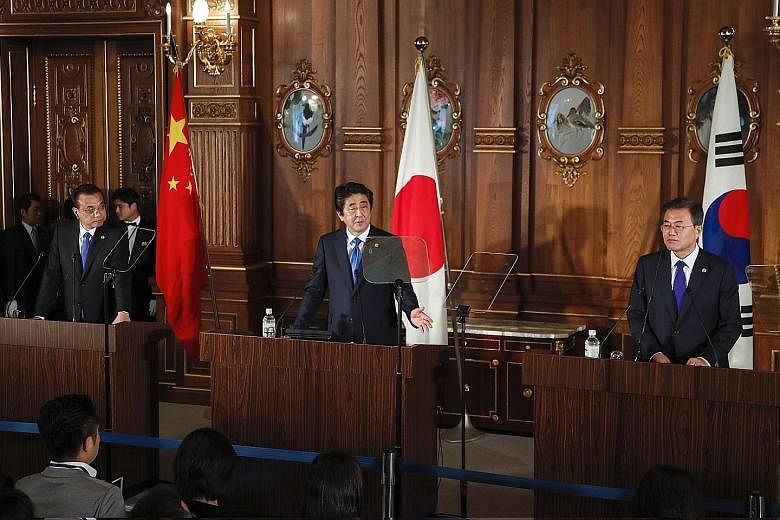The leaders of Japan, China and South Korea may have presented a united front on North Korea and free trade at a trilateral summit yesterday, but it took them more than 12 hours to issue a joint declaration.
In feel-good remarks after a 75-minute meeting - their first in over 2½ years - they stuck largely to broad strokes without diving into the finer details that are at the root of their disagreements.
Papering over these cracks, Japanese Prime Minister Shinzo Abe, Chinese Premier Li Keqiang and South Korean President Moon Jae In emphasised that they were in the driver's seat for a peaceful and prosperous East Asia.
They focused on their common goal of working towards a denuclearised North Korea, and to uphold free trade and oppose protectionism. While they were clear on the outcomes, they were less clear about how to get there.
The delay in the joint declaration was over their differing opinions on denuclearising North Korea.
They eventually settled on one that said Japan and China "especially appreciate and welcome" the Panmunjom Declaration, made after the historic inter-Korea talks on April 27, which "confirmed their common goal of the complete denuclearisation and the establishment of a permanent peace regime in the Korean Peninsula".
Mr Abe, standing between Mr Li and Mr Moon, stressed that they were on the same page about the strict implementation of United Nations Security Council sanctions. He said: "They must be fully implemented. This is our shared stance."
Mr Li, however, chose to focus on the need to "seize the current opportunity to promote a resumption of dialogue", adding that Beijing will continue to "play a constructive role".
Later, during their two-way talks, Mr Li and Mr Moon discussed offering North Korea adequate reward for its denuclearisation.
Mr Moon's chief press secretary Yoon Yong Chan said: "They agreed that the international community, including the United States, must actively take part in ensuring a bright future for North Korea through a security guarantee, and support for its economic development if it denuclearises, instead of making unconditional demands."
Dr Lee Seong Hyon, from the South Korean think-tank Sejong Institute said Seoul will not try to sway Tokyo but will persuade Washington instead. "When the US is persuaded, Japan will follow."
Still, Mr Abe won the backing of Beijing and Seoul for the "full resolution" of the longstanding issue of North Korea's abduction of Japanese citizens in the 1970s and 80s. He promised that Tokyo will normalise ties with Pyongyang if all pending issues are resolved.
Mr Abe yesterday accepted invitations from Mr Li and Mr Moon to make official visits to their countries, in a positive sign that the three nations are committed to managing - if not entirely resolving - their differences.
The three leaders also promised to uphold free trade, which has come under pressure over protectionism, with Mr Li citing a Chinese proverb that says: "We must not give up eating for fear of choking".
Their countries together account for nearly a quarter of the world economy, and a fifth of global trade volumes. Mr Li cited a new framework he dubbed the "China-Japan-South Korea plus X model", saying that the three nations can draw on each other's strengths for third-country projects in areas like finance, energy and technology.
In spite of differences over the rigour for free trade deals, they vowed to speed up efforts for a trilateral pact - for which talks began in 2012 - and sought to push for the early conclusion of the Asean-led, 16-nation Regional Comprehensive Economic Partnership deal that also involves Australia, India and New Zealand.
It will be China's turn to chair the next trilateral summit, and the leaders yesterday said they will strive to make it a "regular" event. There was no indication, though, on when this might take place or if it will revert to being an annual affair.
• Additional reporting by Chang May Choon in Seoul

